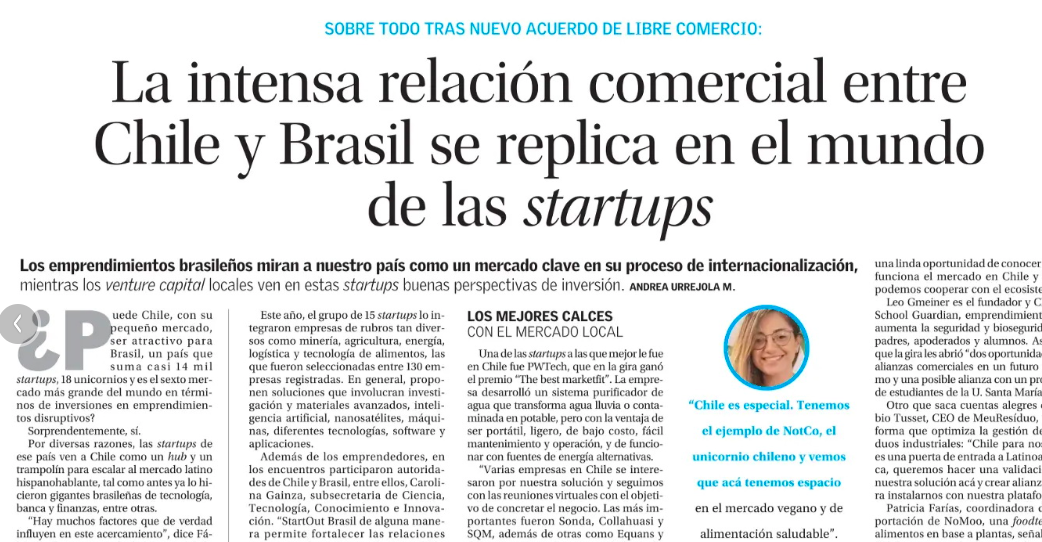Source: El Mercurio
Brazilian startups are looking at our country as a key market in their internationalization process, while local venture capital sees good investment prospects in these startups.
Can Chile, with its small market, be attractive to Brazil, a country with almost 14,000 startups, 18 unicorns, and is the sixth largest market in the world in terms of investments in disruptive ventures?
Surprisingly, yes.
For various reasons, startups from that country see Chile as a hub and a stepping stone to scale into the Spanish-speaking Latin American market, just as Brazilian giants in technology, banking, and finance have done before.
“There are many factors that really influence this approach,” says Fábio Antibas, Business Manager at the Brazilian Embassy in Santiago. “Brazil exports a lot to Chile, and Chile invests a lot in Brazil. This business environment is consolidated,” he complements and emphasizes the importance of the free trade agreement between both economies that came into effect on January 25.
For Antibas, this attractiveness is being recognized by Brazilian startups: “Chile has many advantages for a company that is starting in Brazil because it is a country that uses a lot of technology, its economy is stable and projects confidence for an external investor, and being a small market can be an advantage because it is like a test market. For a startup that is in terms of consolidating, it allows it to operate and expand to other parts.”
Juan Pablo Garnica, investment promotion officer at InvestChile, says, “There is a growing interest from Brazilian companies in the Chilean market. They see us as a good platform to address the rest of Latin America.” Last year, the portfolio of projects from Brazilian companies supported by InvestChile grew an impressive 187% and reached US$1.565 billion.
“Chile serves as a test platform for international expansion: companies that manage to scale their businesses in Chile will be prepared to do so in other markets as well. In addition, it has several trade agreements that offer a connection to other markets, which helps startups that settle in Chile achieve global reach,” summarizes Clarissa Furtado, Competitiveness Manager at the Brazilian Export and Investment Promotion Agency (ApexBrasil).
Seeking the perfect match
This month, 15 Brazilian startups left the country with several business opportunities thanks to the Immersion Mission: Santiago Cycle, organized by StartOut Brasil, which depends on ApexBrasil. “There were 44 meetings with 10 investors, over 60 meetings with potential partners or clients, and they had the opportunity to meet and interact with development agencies, accelerators, and incubators in Chile. The commercial result will be monitored in more detail over the next 30 days,” explains Clarissa Furtado.
The previous version of this tour was in 2019 with 19 startups, and the interest of Chilean investors has been increasing, especially for those focused on clean technologies, biotechnology, as well as fintech, edtech, and foodtech areas. Several of those who visited the country three years ago established themselves in Chile, mainly supported by Start-Up Chile.
This year, the group of 15 startups included companies from diverse sectors such as mining, agriculture, energy, logistics, and food technology, which were selected from among 130 registered companies. In general, they propose solutions that involve advanced research and materials, artificial intelligence, nanosatellites, machines, different technologies, software, and applications.
In addition to entrepreneurs, Chilean and Brazilian authorities participated in the meetings, including Carolina Gainza, Undersecretary of Science, Technology, Knowledge, and Innovation. “StartOut Brasil somehow allows strengthening existing cooperation relationships and also initiatives of scientific and technological base that allow valuing the knowledge developed in our countries,” she asserts.
In the Immersion Mission 2022, more than 30 companies in Chile opened their doors to meet with Brazilian startups with the aim of discovering opportunities for joint work or forming strategic alliances. Among them, Agrosuper, SQM, Collahuasi, Sonda, Entel, Bci, Concha y Toro, Banco Ripley, and Minera Rayrock.
Finding the perfect fit with the local market
One of the startups that had great success in Chile was PWTech, which won the “The Best Marketfit” award on the tour. The company developed a water purification system that transforms rainwater or contaminated water into drinking water, but with the advantage of being portable, lightweight, low cost, easy maintenance and operation, and operating with alternative energy sources.
“Several companies in Chile were interested in our solution, and we continue with virtual meetings with the aim of closing the deal. The most important ones were Sonda, Collahuasi, and SQM, as well as others like Equans and Conecto. Apart from this, we also spoke with other companies with a lot of interest such as Grey Water and RemoteWater. Our solution is intended to cover a need in the Chilean market, to bring drinking water to remote areas. In summary, the week was very productive, and we hope that the business will be concluded as soon as possible,” says Maria Helena C. da Rocha, co-founder and COO of PWTech. She expresses that what they are looking for in the country are local distributors with production potential.
José Lanzi, co-founder of Conatus, a startup that manufactures high-value-added products based on grape and coffee waste, points out: “We were approached by investors and potential clients who wanted to have meetings in the coming days. For our company, it was a nice opportunity to learn how the market works in Chile and how we can cooperate with the ecosystem.”
Leo Gmeiner is the founder and CEO of School Guardian, an enterprise that increases the safety and biosecurity of parents, guardians, and students. He assures that the tour opened up “two opportunities for commercial alliances in the near future and a possible alliance with a project of students from the University of Santa María.”
Another one who is optimistic is Fabio Tusset, CEO of MeuResíduo, a platform that optimizes industrial waste management: “Chile for us is a gateway to Latin America. We want to validate our solution here and create alliances to establish ourselves with our platform.”
Patricia Farías, Export Coordinator of NoMoo, a plant-based foodtech, points out that “Chile is special. We have the example of NotCo, the Chilean unicorn, and we see that here we have space in the vegan and healthy food market. We are looking for importers in Chile, a distributor that works with refrigerated food (because our products are all refrigerated), and investors.”
And the list goes on. Gil Pletsch, founder and CEO of Quiron (which offers monitoring and prediction solutions for agriculture, fires, and deforestation using artificial intelligence and satellite and nanosatellite data), was able to meet with CMPC, Arauco, and Conaf.
“Chile is a technologically mature market, and I think the expected results are to have potential partners and sales channels that help us develop our commercial assistance here,” says Gabriel Rocha, Inside Sales Coordinator at Mindsight, a company that combines psychometric methods with artificial intelligence to facilitate decision-making for executives and human resources professionals.
The investor’s perspective
Several local investors were present on this tour. “It could be interesting for Chilean investors to invest in them because the startups are in a giant market, and if they want solid solutions that have worked,
they have the opportunity to grow within Brazil and also obviously expand to other markets. Just the fact that they are successful in Brazil makes them attractive enough,” says Laura Chicurel from Innova360, the firm in charge of matchmaking.
Javier Cueto, CEO of Grupo Imagine, estimates that “for Chilean investors, given the attractiveness of the Brazilian market, this could be an attractive alternative to relate to a leading investment market in the region and co-invest in high-impact deals, achieving powerful partnerships and expected higher returns.”
In fact, after the demo day that included the tour, several local investors showed enthusiasm. “The startups we saw have very interesting and relevant models and solutions for the Chilean market. That represents a great opportunity from the perspective of local investors, but it also allows these startups to access investors in the rest of Latin America from Chile. For us, it was a very pleasant experience,” says Sebastián González, Head of Venture Partnerships at Wayra.
Jaime Riggs, a venture capital expert, adds that “several of the startups are excellent; I definitely see opportunities to invest in them. They are good entrepreneurs who communicate in several languages and have access to a large market.”
“In 2021, Chile was Brazil’s fifth-largest trading partner, while Brazil is Chile’s third-largest partner. In terms of investments, Brazil remains the favorite destination.”






